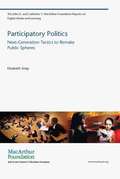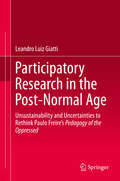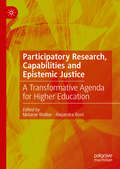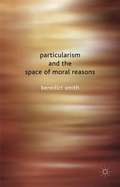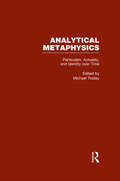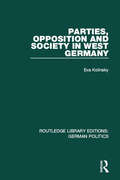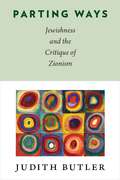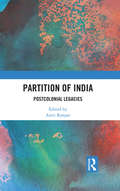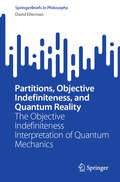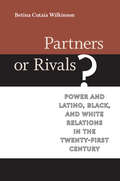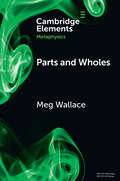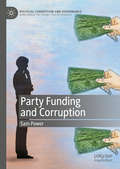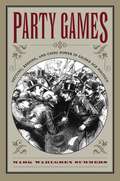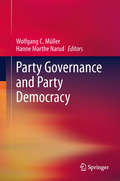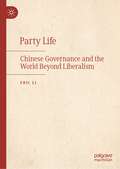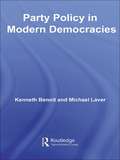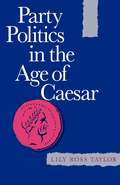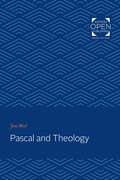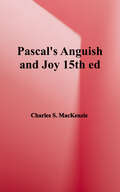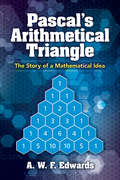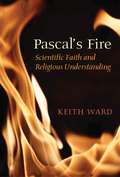- Table View
- List View
Participatory Politics
by Elisabeth SoepAlthough they may disavow politics as such, civic-minded young people use every means and media at their disposal to carry out the basic tasks of citizenship. Through a mix of face-to-face and digital methods, they deliberate on important issues and debate with peers and powerbrokers, redefining some key dynamics that govern civic life in the process. In Participatory Politics, Elisabeth Soep examines the specific tactics used by young people as they experiment with civic engagement. Drawing on her scholarly research and on her work as a media producer and educator, Soep identifies five tactics that are part of effective, equitable participatory politics among young people: Pivot Your Public (mobilizing civic capacity within popular culture engagements); Create Content Worlds (using inventive and interactive storytelling that sparks sharing); Forage for Information in public data archives; Code Up (using computational thinking to design tools, platforms, and spaces for public good); and Hide and Seek (protecting privacy and information sources). After describing these tactics as they manifest themselves in a range of youth-driven activities -- from the runaway spread of the video Kony 2012 to community hackathons -- Soep discusses concrete ideas for cultivating the new literacies that will enable young people to participate in public life. She goes on to consider some risks associated with these participatory tactics, including simplification and sensationalism, and ways to avoid them, and concludes with implications for future research and practice.
Participatory Research in the Post-Normal Age: Unsustainability and Uncertainties to Rethink Paulo Freire's Pedagogy of the Oppressed
by Leandro Luiz GiattiThis book shows how participatory research can provide tools to overcome the current epistemic and ethical challenges faced by traditional scientific approaches. Ever since Funtowicz and Ravetz proposed the notion of post-normal science, there has been a growing awareness of the limits of a form of knowledge production based only on the traditional scientific peer communities that excludes other social groups affected by its results and applications. The growing uncertainty and complexity posed by socio-ecological issues in the interactions between science, society and decision making has revealed the importance of a social quality control over crucial decisions that rely on scientific research and the necessary democratization of knowledge to tackle sustainability and health concerns.Departing from a reinterpretation of Paulo Freire’s Pedagogy of the Oppressed, this volume shows how participatory research can contribute to reconnect science and society by extending peer communities through the incorporation of different forms of knowledge and different social actors into research projects. To do so, the author presents a critical review of different participatory research approaches, identifying the elements that distinguish a true participatory research from a traditional one, and proposing a taxonomy of the various participatory methodologies. The volume also analyzes a diversity of social practices and understandings that deal with an ecology of knowledge and its systemic characteristics. Moreover, it demonstrates that uncertainties can be integrated in dialogical processes that open possibilities for a myriad of outcomes. Participatory Research in the Post-Normal Age - Unsustainability and Uncertainties to Rethink Paulo Freire's Pedagogy of the Oppressed will be of interest to researchers working with participatory approaches in different fields like health, environmental sciences, and education, as well as to practitioners of action research concerned with scientific dilemmas and counter-hegemonic strategies.
Participatory Research, Capabilities and Epistemic Justice: A Transformative Agenda for Higher Education
by Melanie Walker Alejandra BoniThis book explores the potential of participatory research and the capability approach to transform understandings of higher education. The editors and contributors illuminate the importance of epistemic in/justice as a foundation to a reflexive, inclusive and decolonial approach to knowledge, as well as its importance to democratic life and participation in higher education. Drawing together eight global case studies, the authors argue for an ecology of knowledge that expands epistemic capabilities in higher education through teaching, research and policy making. Moreover, the chapters illustrate how these epistemic capabilities can be marginalised by both institutions and structural and historical factors; as well as the potential for possibilities when spaces are opened for genuine participation and designed for a plurality of voices. This book will appeal to scholars of social justice and participatory research as well as ongoing debates around decolonising the academy.
Particularism and the Space of Moral Reasons
by Benedict SmithParticularism and the Space of Moral Reasons critically assesses the startling idea that our moral reasoning does not need to use moral principles. If we don't have principles, how do we work out what to do? This book examines 'moral particularism', a controversial idea at the forefront of contemporary moral theory.
Particulars, Actuality, and Identity over Time, vol 4: Analytical Metaphysics (Analytical Metaphysics Ser. #Vol. 4)
by Michael TooleyVolume 4 in the 5-volume series titled Analytical Metaphysics. The essays in this volume are concerned with three main issues. First, what account can be given of the nature of a particular? Second, is identity over time a basic and irreducible relation, or can it be analysed? If so, what is the correct analysis? Third, what account can be offered of what it is to be actual? The final account of this volume involves the claim that actuality is a special property that is possessed by one, and only one, possible world.
Parties, Opposition and Society in West Germany (Routledge Library Editions: German Politics)
by Eva KolinskyIn this volume, originally published in 1984, the author examines the social composition of the electorate, of membership and leadership of West German political parties, as well as their representation and finances. Kolinsky argues that while affiliation and electorates remained distinct, the social composition of party organisations became narrower and more uniform. The book examines how the parties became alienated from contemporary West German society and discusses the difficulties experienced by opposition parties in trying to develop alternative strategies, in particular those of the Green Party.
Parting Ways: Jewishness and the Critique of Zionism (New Directions In Critical Theory)
by Judith ButlerJudith Butler follows Edward Said's late suggestion that through a consideration of Palestinian dispossession in relation to Jewish diasporic traditions a new ethos can be forged for a one-state solution. Butler engages Jewish philosophical positions to articulate a critique of political Zionism and its practices of illegitimate state violence, nationalism, and state-sponsored racism. At the same time, she moves beyond communitarian frameworks, including Jewish ones, that fail to arrive at a radical democratic notion of political cohabitation. Butler engages thinkers such as Edward Said, Emmanuel Levinas, Hannah Arendt, Primo Levi, Martin Buber, Walter Benjamin, and Mahmoud Darwish as she articulates a new political ethic. In her view, it is as important to dispute Israel's claim to represent the Jewish people as it is to show that a narrowly Jewish framework cannot suffice as a basis for an ultimate critique of Zionism. She promotes an ethical position in which the obligations of cohabitation do not derive from cultural sameness but from the unchosen character of social plurality. Recovering the arguments of Jewish thinkers who offered criticisms of Zionism or whose work could be used for such a purpose, Butler disputes the specific charge of anti-Semitic self-hatred often leveled against Jewish critiques of Israel. Her political ethic relies on a vision of cohabitation that thinks anew about binationalism and exposes the limits of a communitarian framework to overcome the colonial legacy of Zionism. Her own engagements with Edward Said and Mahmoud Darwish form an important point of departure and conclusion for her engagement with some key forms of thought derived in part from Jewish resources, but always in relation to the non-Jew.Butler considers the rights of the dispossessed, the necessity of plural cohabitation, and the dangers of arbitrary state violence, showing how they can be extended to a critique of Zionism, even when that is not their explicit aim. She revisits and affirms Edward Said's late proposals for a one-state solution within the ethos of binationalism. Butler's startling suggestion: Jewish ethics not only demand a critique of Zionism, but must transcend its exclusive Jewishness in order to realize the ethical and political ideals of living together in radical democracy.
Partition of India: Postcolonial Legacies
by Amit RanjanThe Partition of British India in 1947 set in motion events that have had far-reaching consequences in South Asia – wars, military tensions, secessionist movements and militancy/terrorism. This book looks at key events in 1947 and explores the aftermath of the Partition and its continued impact in the present-day understanding of nationhood and identity. It also examines the diverse and fractured narratives that framed popular memory and understanding of history in the region. The volume includes discussions on the manner in which regions such as the Punjab, Sindh, Kashmir, Bengal, Uttar Pradesh (Lucknow) and North-East India were influenced. It deals with issues such as communal politics, class conflict, religion, peasant nationalism, decolonization, migration, displacement, riots, the state of refugees, women and minorities, as well as the political relationship between India, Pakistan and Bangladesh. Drawing on major flashpoints in contemporary South Asian history along with representations from literature, art and popular culture, this book will interest scholars of modern Indian history, Partition studies, colonial history, postcolonial studies, international relations, politics, sociology, literature and South Asian studies.
Partitions, Objective Indefiniteness, and Quantum Reality: The Objective Indefiniteness Interpretation of Quantum Mechanics (SpringerBriefs in Philosophy)
by David EllermanThis book presents a new ‘partitional' approach to understanding or interpreting the math of standard quantum mechanics (QM). The thesis is that the mathematics (not the physics) of QM is the Hilbert space version of the math of partitions on a set and, conversely, the math of partitions is a skeletonized set level version of the math of QM. Since at the set level, partitions are the mathematical tool to represent distinctions and indistinctions (or definiteness and indefiniteness), this approach shows how to interpret the key non-classical QM notion of superposition in terms of (objective) indefiniteness between definite alternatives (as opposed to seeing it as the sum of ‘waves'). Thus, the book develops a new mathematical, or indeed, logical, approach to the century-old problem of interpreting quantum mechanics, ensure it is of interest to philosophers of science as well as mathematicians and physicists.
Partners or Rivals?: Power and Latino, Black, and White Relations in the Twenty-First Century (Race, Ethnicity, and Politics)
by Betina Cutaia WilkinsonThe emerging demographic and political presence of Latinos in the United States has moved the discussion of race relations beyond the terms of black and white. Using a variety of theoretical approaches, Betina Cutaia Wilkinson assesses Latinos', blacks', and whites' perceptions of commonality and opposition in order to reach a more nuanced understanding of the factors affecting political competition versus cooperation among these groups. In the most comprehensive analysis of Latino, black, and white relations to date, Wilkinson explores the extent to which these groups regard each other as partners or rivals and uncovers the motivations that contribute to those views. Relying on national survey and focus group data, the author examines how social interaction; feelings of identification with members of their own group and others; and individuals' sense of power as established by their racial, economic, and political surroundings impact interracial attitudes. Her findings, like the complex racial dynamics she studies, are not easily reducible to simple formulae, yet they have strong implications for the formation of interracial coalitions. For example, even if social contact generally decreases racial and ethnic hostility, the disadvantaged status of Latinos and blacks tends to impede cooperation and ramp up rivalry, leaving members of both groups more inclined to form coalitions with whites than with each other. Yet contextual factors in particular jurisdictions, such as the availability of quality education and higher wages overall, can mitigate antagonism and increase the likelihood of cooperation. Ultimately, Partners or Rivals? provides a timely account of contemporary race relations and the prospects for interracial and interethnic cooperation, pinpointing the sometimes surprising factors that have a realistic chance of improving those prospects.
Partnerships in Education: Risks in Transdisciplinary Educational Research (Transdisciplinary Perspectives in Educational Research #5)
by Kathrin Otrel-Cass Karen J. C. Laing Janet WolfThis book contains a series of unique international contributions that explore risk in partnerships involving education. Presenting a range of theoretical, methodological and practical perspectives, the book discusses aspects such as the role of motivation, leadership, process and context in such partnerships and provides examples of research methods for examining them. It illuminates the different histories and disciplinary backgrounds of partners, showing that risk can reside in the different expectations, understandings and interpretations that each partner brings to educational partnerships. The eighteen chapters discuss critical examinations of educational partnerships from very different perspectives, including formal learning institutions and community partners, and include the voices from children, students, teachers and policy makers. The book provides insights for everyone who is considering the challenges that can arise in partnerships and will be useful for researchers at different levels and those who are planning to forge new partnerships or think about what may present itself to be a challenge, and how to address and overcome such challenges.
Parts and Wholes: Spatial to Modal (Elements in Metaphysics)
by Meg WallaceThe Odd Universe Argument aims to show that from four intuitive assumptions about parts and wholes, we can conclude a priori that there is an odd number of things in the universe. This Element investigates how this is so and where things might have gone awry. Section 1 gives an overview of general methodology, basic mereology, and plural logic. Section 2 explores questions about the nature of composition and decomposition. Does composition always occur? Never? Sometimes? Is the universe, at rock bottom, just many partless bits (simples)? Or do the parts have parts all the way down (gunk)? Section 3 looks at arguments for and against the thesis that composition is identity, with a healthy bias in its favor. In the wake of this discussion, we reconsider our methods of counting. We conclude with a return to the odd universe argument and suggestions on how best to resist it.
Party Funding and Corruption (Political Corruption and Governance)
by Sam PowerThis book systematically explores the relationship between party funding and corruption, and addresses fundamental concerns in the continued consideration of how democracy should function. The book analyses whether parties funded primarily through private donations are necessarily more corrupt than those funded by the state, and whether different types of corruption are evident in different funding regimes. Drawing on a comparison of Great Britain and Denmark, the author argues that levels of state subsidy are, in fact, unrelated to the type of corruption found. Subsidies are not a cure for corruption or, importantly, perceived corruption, so if they are to be introduced or sustained, this should be done for other reasons. Subsidies can, for example, be justified on grounds of public utility. Meanwhile, anti-corruption measures should focus on other regulations, but even then we should not expect such measures to impact on perceptions of corruption in the short term.
Party Games
by Mark Wahlgren SummersMuch of late-nineteenth-century American politics was parade and pageant. Voters crowded the polls, and their votes made a real difference on policy. In Party Games, Mark Wahlgren Summers tells the full story and admires much of the political carnival, but he adds a cautionary note about the dark recesses: vote-buying, election-rigging, blackguarding, news suppression, and violence. Summers also points out that hardball politics and third-party challenges helped make the parties more responsive. Ballyhoo did not replace government action. In order to maintain power, major parties not only rigged the system but also gave dissidents part of what they wanted. The persistence of a two-party system, Summers concludes, resulted from its adaptability, as well as its ruthlessness. Even the reform of political abuses was shaped to fit the needs of the real owners of the political system--the politicians themselves.
Party Governance and Party Democracy
by Hanne Marthe Narud Wolfgang C. MüllerGiven the centrality of political parties in modern democracies, most research on these systems either directly address their internal functioning and activities or question their critical role. Political science has moved from describing institutions to the thorough analysis of behavior within these institutions and the interactions between them. The inevitable consequences of the maturing and institutionalization of the discipline of political science in many countries include the forming of sub-fields and specialized research communities. At the same time the number of democracies has vastly increased since the 1980s and although not each attempt at democratization was eventually successful, more heterogeneous systems with some form of party competition exist than ever before. As a consequence, the literature addressing the large issues of party democracy spreads over many research fields and has become difficult to master for individual students of party democracy and party governance. The present volume sets out to review the behavior and larger role of political parties in modern democracies. In so doing the book takes its departure from the idea that the main contribution of political parties to the working of democracy is their role as vehicles of political competition in systems of government. Consequently the focus is not merely in the internal functioning of political parties, but rather their behavior the electoral, legislative, and governmental arenas. Thus several chapters address how political parties perform within the existing institutional frameworks. One more chapter looks at the role of political parties in building and adapting these institutions. Finally, two chapters explicitly address the party contributions to democracy in established and new democracies, respectively.
Party Life: Chinese Governance and the World Beyond Liberalism
by Eric LiThe emergence of China as a great power is perhaps the most consequential development for the world in the 21st century. Yet, what the Western world sees in this development is largely through the prism of misinterpreted ideological dichotomy and misguided geopolitical rivalry. This book offers a deep look at the Chinese Communist Party and the nation it leads at conceptual, historic, and operational levels. If Thomas Kuhn’s concept of paradigm shift can be used in the social sciences, then China would represent the most significant anomaly to the dominant liberal exemplar. For students of China and of politics in general, and for the Western political and commercial elites, if they were to read one book about China to grasp the nature and weight of the Chinese phenomenon, Party Life would be it.
Party Polarization in Congress
by Sean M. TheriaultThe political parties in Congress are as polarized as they have been in 100 years. This book examines more than 30 years of congressional history to understand how it is that the Democrats and Republicans on Capitol Hill have become so divided. It finds that two steps were critical for this development. First, the respective parties' constituencies became more politically and ideologically aligned. Second, members, in turn, ceded more power to their party leaders, who implemented procedures more frequently and with greater consequence. In fact, almost the entire rise in party polarization can be accounted for in the increasing frequency of and polarization on procedures used during the legislative process.
Party Policy in Modern Democracies (Routledge Research in Comparative Politics #Vol. 19)
by Michael Laver Kenneth BenoitA new and wide-ranging empirical overview of party policy in 47 modern democracies, including all of the new democracies of Eastern Europe. It updates and radically extends Policy and Party Competition (1992), which established itself as a key mainstream data source for all political scientists exploring the policy positions of political parties. This essential text is divided into three clear parts: Part I introduces the study, themes and methodology Part II deals in depth with the wide range of issues involved in estimating and analyzing the policy positions of key political actors. Part III is the key data section that identifies key policy dimensions across the 47 countries, detailing their party positions and median legislators, and is complemented by graphical representations of each party system. This book is an invaluable reference for all political scientists, particularly those interested in party policy and comparative politics.
Party Politics in the Age of Caesar (Sather Classical Lectures #22)
by Lily Ross TaylorThe advice given to Cicero by his astute, campaign-conscious brother to prepare him for the consular elections of 64 B.C., has a curiously modern ring: "Avoid taking a definite stand on great public issues either in the Senate or before the people. Bend your energies towards making friends of key-men in all classes of voters."Party Politics in the Age of Caesar is a shrewd commentary on this text, designed to clarify the true meaning in Roman political life of such terms as "party" and "faction." Taylor brilliantly explains the mechanics of Roman politics as she discusses the relations of nobles and their clients, the manipulation of the state religion for political expedience, and the practical means of delivering the vote.
Pascal Pensées
by Blaise Pascal A. J. KrailsheimerBlaise Pascal, the precociously brilliant contemporary of Descartes, was a gifted mathematician and physicist, but it is his unfinished apologia for the Christian religion upon which his reputation now rests. The Penseesis a collection of philosophical fragments, notes and essays in which he explores the contradictions of human nature in psychological, social, metaphysical and, above all, theological terms. Mankind emerges from Pascal's analysis as a wretched and desolate creature within an impersonal universe, but whose existence can be transformed through faith in God's grace. This masterly translation conveys Pascal's disarmingly personal tone and captures all the fire and passion of the original. Also contained in this volume are a comparison between different editions, appendices and a bibliography
Pascal and Theology
by Jan MielOriginally published in 1970. The question of man's freedom to exercise his will—as active an issue among twentieth-century philosophers and theologians as it was in the Jesuit and Jansenist camps known to Pascal—is basic to this study. Pascal's theological thinking, which Professor Miel demonstrates to be the source of unity and coherence in virtually all phases of his thought, is preoccupied by a concern for man's limitations. In his analysis of Pascal's theology, Miel is concerned not only with characterizing Pascal's theological position but also with evaluating it in terms of the history of the church. In a concise and lucid review of the Christian doctrine of grace from the pre-Augustinians through the Renaissance, the author identifies the intellectual-theological atmosphere that created the need for Pascal's strong defense of Augustinian theology. Miel considers Pascal's Écrits sur la grâce, Lettres provincials, and Pensées as well as shorter compositions and correspondence. He establishes the content of Pascal's vision of grace and free will, noting both its originality and its sense of history. Most importantly, he asserts that Pascal's affirmation of Jansenism predated his association with Port Royal and, indeed, was basic to all his adult thought and work. The author finds in the writings of Pascal a style that anticipates twentieth-century theology, a sophistication that belies charges of Pascal's theological naïveté, and a concern to uphold rather than to undermine doctrinal traditions of the church.
Pascal the Philosopher
by Graeme HunterBlaise Pascal has always been appreciated as a literary giant and a religious guide, but has received only grudging recognition as a philosopher: philosophers have mistaken Pascal's harsh criticism of their discipline as a rejection of it. But according to Graeme Hunter, Pascal's critics have simply failed to grasp his lean, but powerful conception of philosophy. This accessibly written book provides the first introduction to Pascal's philosophy as an organic whole.Hunter argues that Pascal's aim is not merely to humble philosophy, but to save it from a kind of failure to which it is prone. He lays out Pascal's development of a more promising and fruitful path for philosophical inquiry, one that responded to the scientific, religious, and political upheaval of his time. Finally, Hunter illuminates Pascal's significance for contemporary readers, allowing him to emerge as the rare philosopher who is spiritual, literary, and rigorous all at once - both a brilliant controversialist and a thinker of substance.
Pascal's Anguish and Joy
by Charles S. MacKenzieThis volume seeks first to outline and to interpret his life, his feelings and his thought, showing something of the influences which shaped both his faith and his doubt. It attaches special significance to the interaction between Blaise and his sister Jacqueline. It describes his quest for an abiding faith. He had faith in reason, but then he doubted reason. He had faith in science, but then he discovered science had its limitations. He had faith in the Roman Catholic Church, but then he questioned the Church. His pilgrimage into certitude and unshakable faith is the subject of chapters one through ten. Secondly, chapters eleven through seventeen describe something of what he said to sceptics and what he says to us moderns as we, in an age of violence, journey from doubt and anguish toward faith and certitude. Throughout this study of Pascal, references to his "Pensees" will be followed by two numbers in parentheses. The first is the number assigned by Lafuma. The second is that assigned by Brunschvicg. The author favors the ordering of Lafuma since it is closer to that intended by Pascal himself. In addition, whenever a reference is made to the "Oeuvres," it refers to Leon Brunschvicg's monumental work listed in the Appendix. This volume has been written in the hope that it will be of assistance to others in their journey from the anguish of doubt to the joy of faith.
Pascal's Arithmetical Triangle: The Story of a Mathematical Idea (Dover Books on Mathematics)
by A.W.F. EdwardsThis survey explores the history of the arithmetical triangle, from its roots in Pythagorean arithmetic, Hindu combinatorics, and Arabic algebra to its influence on Newton and Leibniz as well as modern-day mathematicians.
Pascal's Fire: Scientific Faith and Religious Understanding
by Keith WardCombining cutting edge-science with thought-provoking discourses about morality, religion and the meaning of life, Keith Ward provides a fascinating take on the science versus religion debate, offering 'a third way' which is guaranteed to spark debate for years to come.
